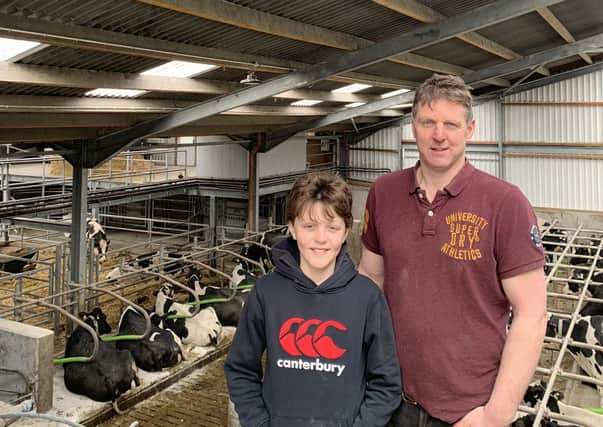Cloughmills farmer wins nationwide stock judging competition


Robin Orr from Cloughmills entered the ‘You be the Judge’ stock judging competition run by animal health company Zoetis and National Milk Records (NMR) in December and January.
The competition asked farmers to rank six dairy heifers based on visual observations from a photo, their parent average and ancestry data. The heifers had all been genomically tested, and the competition entries were compared with their genomic ranking.
Advertisement
Advertisement
Out of the 450 entries, no one was able to rank all six correctly according to their genomic index. However, Mr Orr was able to rank four out of the six animals correctly.
The competition aimed to highlight the pitfalls of trying to predict a heifer’s potential accurately from a visual assessment and her parent averages when compared to her own genomic test.
Genomic testing involves a small tissue or hair sample being taken from the animal; their DNA is then extracted from this. By looking at variations in their DNA, farmers receive a prediction on which animals are likely to produce the most milk, stay healthy and be more sustainable, from both a farm and environmental point of view.
Zoetis Ruminant Veterinary Consultant Joshua Batterham said: “Using genomics gives farmers a clearer idea of the potential of a heifer from as early as six weeks of life, which is something that cannot be done accurately using visual observations and parent averages alone, as this competition has shown.
Advertisement
Advertisement
“By accurately predicting the genetic potential of each animal in a herd, farmers can manage how they treat individuals, such as deciding which animals to breed replacements from, which to put to beef, as well as those they may consider selling. It also helps inform bull choice by correcting parentage and aiding corrective mating.
“Sustainability is at the forefront of many farmer’s minds as we move away from subsidy payments to other forms of support payments, which will reward good animal health, welfare and land management. Genomics has a huge part to play in helping farmers during this transition.”
NMR Genomic Services Manager Richard Miller who works in partnership with Zoetis to offer the genomic testing service CLARIFIDE® Plus to farmers, alongside operating NMR’s in-house GeneEze genomics service, added: “Traditional means of assessing dairy youngstock cannot compete with accuracy gained from genomic test results.
“There is a significant difference in the reliability of the two predictions, with the parent average prediction offering around 30% reliability for heifers, compared with up to 70% reliability from a genomic test.
Advertisement
Advertisement
“Genomic testing can be used to increase the odds of making the best selections and improve the rate of progress in dairy herds.”
NMR estimates significant increases in milk value and genetic merit can be gained by genomic testing heifers.
“In the past few years, we have carried out genetic value audits for many herds interested in genomic testing,” adds Mr Miller. “From these, we see that on average, for every £100 uplift in £PLI within the herd, an extra £400 in milk sales per cow is generated by the end of lactation three. This is before the additional benefits gained through improved health, lifespan and fertility are taken into account.
“Using a genomically-based index to select optimal breeding groups from across the herd offers fantastic opportunities to really increase genetic progress, and profitability, in the future herd,” he adds.
Advertisement
Advertisement
Mr Orr runs the 180-cow NMR-recorded Ballyportery Holstein Herd in Cloughmills, milking cows through three robotic milking machines. He has won 25 Clarifide Plus genomic tests as part of his prize.
Mr Orr hopes Clarifide Plus will give him a better understanding of how his heifers rank. He said: “We have been genomically testing about 65-70 heifers a year but still retaining most of them for breeding. Now we are in a position to be able to sell some heifers, we hope that selecting on DWP will help us select the best heifers for our herd.”
Mr Orr says switching to robotic milking has altered his breeding criteria, something he hopes testing with Clarifide Plus will help with. He said: “Since we have installed the robots our selection criteria have changed. Teat placement and milking speed are important. Fat and protein are struggling with average yields of 11,500l and rising yields, so they are also important traits for us to select for.”
Peter Lawley from Stoke on Trent was also named as a winner and took home 25 of the new in-house genomic tests offered by NMR called GeneEze.